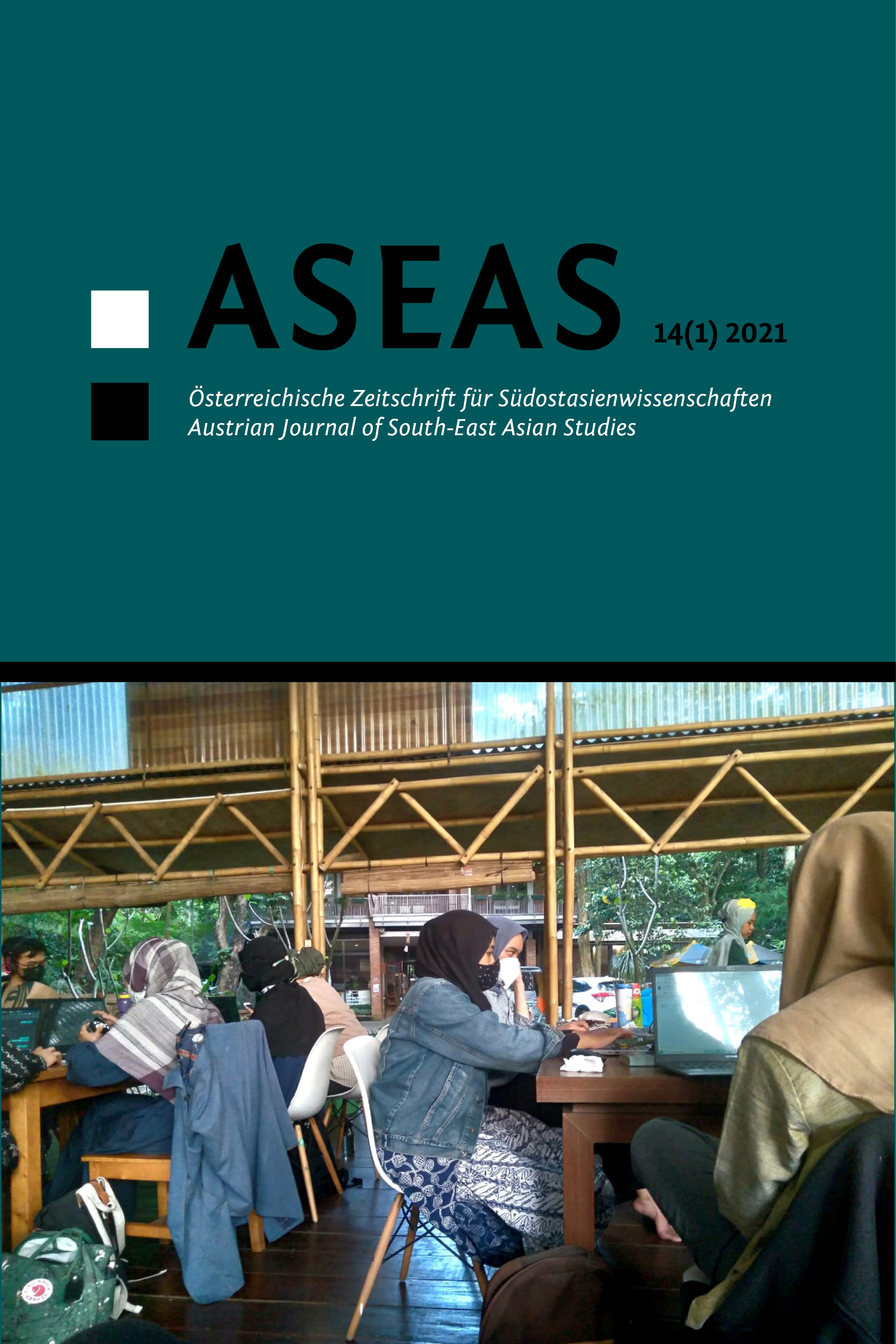Social Media in Research on a Marginalized Identity: The Case of Atheism in Indonesia
DOI:
https://doi.org/10.14764/10.ASEAS-0049Keywords:
Atheism, Indonesia, Online Participant Observation, Social mediaAbstract
Social media have played a major role as a place where one can meet and socialize with like-minded people, and this is especially important for marginalized groups. Atheists depict such a group in Indonesia where public expressions of atheism are punishable. Whereas social media often plays an important role in finding like-minded people, it is also potentially dangerous to reject religion on social media. In this research workshop, I argue that insights into the ways in which atheists use and engage in social media groups are crucial if one wants to know more about atheist ways of life in Indonesia. However, atheist groups are subject to internal fragmentation, as atheism in Indonesia is highly diverse, and, as a researcher, one can find oneself caught up in these internal struggles. Finally, I argue that social media research is an important addition to offline research, since it enables the researcher, especially when dealing with sensitive issues and identities, to directly enter and critically engage with the premises in which such identities are constituted and developed.
References
Al Hariri, Y., Magdy, W., & Wolters, M. (2019). Arabs and atheism: Religious discussions in the Arab Twittersphere. In I. Weber, K. Darwish, C. Wagner, E. Zagheni, L. Nelson, & S. Aref (Eds.), Social informatics. SocInfo 2019. Lecture notes in computer science (pp. 18-34). Springer.
Binder, S. (2020). Total atheism: Secular activism and politics of difference in India. Berghahn.
Blechschmidt, A. (2018). The secular movement in the Philippines: Atheism and activism in a Catholic country. Dissertation, University of Zürich. https://www.zora.uzh.ch/id/eprint/157305/1/157305.pdf
Bruinessen, M. van (2013). Introduction: Contemporary developments in Indonesian Islam and the “Conservative Turn” of the early twenty-first century. In M. van Bruinessen (Ed.), Contemporary developments in Indonesian Islam. Explaining the “Conservative Turn” (pp. 1-20). ISEAS Publishing.
Duile, T. (2017, September 13). Indonesian secularists and atheists live under the shadow of stigma. The Conversation. https://theconversation.com/indonesian-secularists-and-atheists-live-under-theshadow-of-stigma-82697
Duile, T. (2018). Atheism in Indonesia: State discourses of the past and social practices of the present. South East Asia Research, 26(2), 161-175.
Duile, T. (2020). Being atheist in the religious harmony state of Indonesia. The Asia Pacific Journal of Anthropology, 21(5), 450-465.
Hasani, I. (2016). The decreasing space for non-religious expression in Indonesia. The case of atheism. In T. Lindsay & H. Pausacker (Eds.), Religion, law and intolerance in Indonesia (pp. 197-210). Routledge.
Kovacs, A. (2012). Religiöse Diskriminierung in Indonesien – ambivalente Rechtslage und politische Passivität [Religious discrimination in Indonesia – ambivalent legal situation and political passiveness]. GIGA-Focus Nr. 11. https://pure.giga-hamburg.de/ws/files/23176491/web_asien_2012_11.pdf
Pearl, H. (2018, July 11). Living a double life: Indonesia’s atheists fear jail or worse. Jakarta Post. https://www.thejakartapost.com/news/2018/07/11/living-a-double-life-indonesias-atheists-fear-jail-or-worse.html
Quack, J. (2012). Organized atheism in India: An overview. Journal of Contemporary Religion, 27(1), 67-85.
Ridwan, R., & Wu, J. (2018). ‘Being young and LGBT, what could be worse?’ Analysis of youth LGBT activism in Indonesia: Challenges and ways forward. Gender and Development, 26(1), 121-138.
Schäfer, S. (2016). Forming ‘forbidden’ identities online: Atheism in Indonesia. Austrian Journal of South-East Asian Studies, 9(2), 253-268.
Sinn, S. (2014). Religiöser Pluralismus im Werden. Religionspolitische Kontriversen und theologische Perspektiven von Christen und Muslimen in Indonesien. Mohr Siebeck.
Valbiant (2020). Civility. Indonesian atheist ‘ask me anything’ group promotes civil online discussion of a hot topic. Inside Indonesia, 140. https://www.insideindonesia.org/civility
Downloads
Published
Issue
Section
License
Copyright (c) 2021 Society for South-East Asian Studies (SEAS)

This work is licensed under a Creative Commons Attribution-NonCommercial-NoDerivatives 4.0 International License.
For all articles published in ASEAS before December 2014 and after July 2022, copyright is retained by the authors. For articles published between January 2015 and June 2022, the Society for South-East Asian Studies (SEAS) is the copyright holder. Articles published in ASEAS before December 2019 are licensed under the following Creative Commons License: Attribution-NonCommercial-NoDerivs 3.0 Unported. Articles published after that date are licensed under the following Creative Commons License: Attribution-NonCommercial-NoDerivs 4.0 International. In both cases, this means that everybody is free to share (to copy, to distribute, and to transmit the work) under the following conditions:
-
Attribution — You must give appropriate credit, provide a link to the license, and indicate if changes were made. You may do so in any reasonable manner, but not in any way that suggests the licensor endorses you or your use.
-
NonCommercial — You may not use the material for commercial purposes.
-
NoDerivatives — If you remix, transform, or build upon the material, you may not distribute the modified material.


